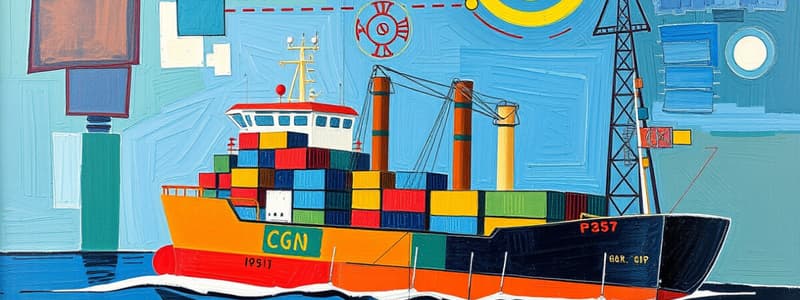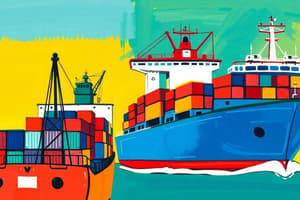Podcast
Questions and Answers
What is the effective date for SOLAS regulation II-1/3-6?
What is the effective date for SOLAS regulation II-1/3-6?
The effective date is January 1, 2007.
Which types of vessels are primarily affected by SOLAS regulation II-1/3-6?
Which types of vessels are primarily affected by SOLAS regulation II-1/3-6?
Oil tankers of 500 G/T and over, and bulk carriers of 20,000 G/T and over.
What does paragraph 1.1 of SOLAS regulation II-1/3-6 state about its application?
What does paragraph 1.1 of SOLAS regulation II-1/3-6 state about its application?
It states that the regulation applies to oil tankers and bulk carriers constructed on or after January 1, 2006.
What is the purpose of IACS UI SC226 within the context of SOLAS regulations?
What is the purpose of IACS UI SC226 within the context of SOLAS regulations?
Which resolutions are referenced for unified interpretations of SOLAS Chapters II-1 and XII?
Which resolutions are referenced for unified interpretations of SOLAS Chapters II-1 and XII?
What types of grating systems are mentioned in the document?
What types of grating systems are mentioned in the document?
What should be included in the existing dropped object checklists?
What should be included in the existing dropped object checklists?
What is required for the fasteners of the grating?
What is required for the fasteners of the grating?
What updates may be needed in response to the grating safety concerns?
What updates may be needed in response to the grating safety concerns?
Where should potential incidents related to grating be considered?
Where should potential incidents related to grating be considered?
Flashcards are hidden until you start studying
Study Notes
Regulation 9: Surveys of Radio Installations of Cargo Ships
- Radio installations on cargo ships, including those for life-saving equipment, require specific surveys.
- Initial survey mandated before a ship enters service.
- Renewal survey must occur at intervals set by administration, not exceeding five years.
- Periodical surveys occur within three months before or after each anniversary of the Cargo Ship Safety Radio Certificate.
- Additional survey requirements align with those for passenger ships as stated in regulation 7(b)(iii).
- Initial survey to include a thorough inspection ensuring compliance with present regulations.
- Renewal and periodical surveys also require inspections of radio installations for regulatory compliance.
- Periodical survey endorsements must be recorded on the Cargo Ship Safety Radio Certificate.
Certificates and Validity
- Cargo Ship Safety Construction Certificate, Safety Equipment Certificate, and Safety Radio Certificate have a maximum validity of five years.
- Exemption Certificates cannot exceed the duration of associated certificates.
- New certificates from renewal surveys vary based on completion timing relative to existing certificate expiration.
- For renewal within three months before expiration: a new certificate valid for up to 12 months (passenger ships) or five years (cargo ships).
- Renewal after expiration grants a new certificate valid for the same time frames as above.
- Early renewal (more than three months prior) grants validity for up to 12 months from renewal completion (passenger ships) or five years (cargo ships).
- Certificates become invalid if required surveys are not completed or certified correctly or if the ship transfers flags.
SOLAS Amendments and Definitions
- Regulation 2 defines key terms including 'subdivision length', 'amidships', 'forward terminal', and 'aft terminal'.
- Definitions align with International Convention on Load Lines specifications.
- Regulation 3-6 applies to oil tankers (≥ 500 G/T) and bulk carriers (≥ 20,000 G/T) constructed after January 1, 2006.
- Provides guidelines for access to spaces in and forward of cargo areas on specified tankers and carriers.
- Unified interpretations guide regulation application to various vessel conversions and inspections.
Effective Dates and Retroactivity
- Various regulations have specific effective dates; certain ships constructed after specified dates are subject to updated requirements.
- Some amendments retroactively apply to existing ships to align with updated safety and compliance standards.
Polymer Grating Systems and Safety Measures
- Potential risks identified in areas with grating onboard vessels, especially in towers, cranes, and access platforms.
- Glass Reinforced Plastics (GRP) and Fibre Reinforced Plastics (FRP) are commonly used materials.
- Importance of proper installation according to OEM instructions to prevent grating from becoming loose.
Safety Checks and Maintenance Updates
- Dropped object checklists should include risks associated with grating.
- Ongoing updates to planned maintenance systems are essential for safety.
Rope Access Operations
- Comprehensive task planning and Job Safety Analysis (JSA) critical for mitigating risks.
- Emphasis on avoiding shortcuts to prevent incidents.
- Significant measures taken: safety stand-downs, hazard awareness training, and refresher courses for rope access teams.
Mooring Operations Incidents
- Incident 1: A crew member suffered a fractured arm when a mooring rope became taut unexpectedly due to miscommunication during an operation.
- Incident 2: Lack of planning led to a serious hand injury when a dock worker got caught between ropes, highlighting the need for proper risk assessment.
- Both incidents emphasized the importance of clear, understood communications and avoidance of unsafe positioning (line of fire).
Key Lessons Learned from Incidents
- Importance of following instructions and minimizing confusion during operations.
- Need for thorough training on Line of Fire risks and specific duties of supervisors and team leaders.
- Encouragement to always stop and reassess if risks are identified, maintaining safety protocols.
Other Notable Incidents
- A rigger was injured when his finger got trapped during lifting operations due to poor communication and lack of situational awareness with equipment.
- Identified causes included complacency, absence of clear communication, and improper risk assessment of the task at hand.
General Safety Takeaways
- Continuous emphasis on safety training, awareness of potential hazards, and adherence to established protocols can significantly reduce the likelihood of incidents.
Studying That Suits You
Use AI to generate personalized quizzes and flashcards to suit your learning preferences.




